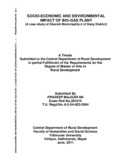Please use this identifier to cite or link to this item:
https://elibrary.tucl.edu.np/handle/123456789/3499| Title: | Socio-Economic and Environmental Impact of Bio-Gas Plant (A case study of Ghorahi Municipality-2 of Dang District) |
| Authors: | Majgaiyan, Pradeep |
| Keywords: | Socio economics;Environmental impact |
| Issue Date: | 2011 |
| Publisher: | Central Department of Rural Development |
| Institute Name: | Central Department of Rural Development |
| Level: | Masters |
| Abstract: | Nepal is one of the lowest energy consuming countries in the world. More than 85 percent of its total energy comes from traditional biomass energy such as from forests, agricultural residues, and by-products from crops which lead to environmental degradation and ecological imbalance and adverse human health impacts too. Beside the carbon revenue, other quantifiable tangible benefits are also associated with the technology. The main objective of the study was to study about the socio-economic and environmental impacts of biogas. The present study was based mainly on primary data. They were used to estimate and analyze the socio-economic and environmental impact of biogas on the surveyed households. The household survey, informal meeting, focus group discussion, key informant interview and observations. The study entailed biogas was used only for cooking purpose whereas almost all the Non-Biogas Households dependent on fuel wood for regular cooking purpose. Each biogas. Biogas contributed in improved sanitation, reduction in smoke and significant reduction in respiratory and eye related disease. Biogas plants, one of the best options for meeting the growing need of fuel in the rural as well as in the urban areas, is being popular in the recent years in Nepal. Since, Nepal is an agricultural country, each and every household rear buffaloes, cattle and dung of them is the best source of raw material for biogas plants. It is clean energy used especially for cooking and in some extent, for lightening. Since, it uses the locally available resources, it is gaining high popularity. Thus, installation of biogas plants has been increasing rapidly. Realizing the existing problem of energy, Government of Nepal, Different NGOs and INGOs have been incorporating in the installation of the biogas plants. The major advantage the bio-gas plant brought is the reduction of smoke free environment smoke in kitchen are other advantage is that the prevalence of insect has become very low than it was before installation of plant. This smoke free environment in the kitchen improves air quality ultimately leading to improvement in health condition of women because they have to always work in kitchen. Adversely, the installation of biogas plant has significantly increased the problem of mosquitoes. The development of the biogas energy can significantly cut down the use of firewood, animal dung, agricultural residue, kerosene, LPG. In the study area, biogas was mainly used for cooking foods. Biogas technology has primarily reduced the use of fuel wood. |
| URI: | http://elibrary.tucl.edu.np/handle/123456789/3499 |
| Appears in Collections: | Rural Development |
Files in This Item:
| File | Description | Size | Format | |
|---|---|---|---|---|
| SOCIO-ECONOMIC AND ENVIRONMENTAL IMPACT OF BIO-GAS PLANT.pdf | 2.4 MB | Adobe PDF |  View/Open |
Items in DSpace are protected by copyright, with all rights reserved, unless otherwise indicated.
